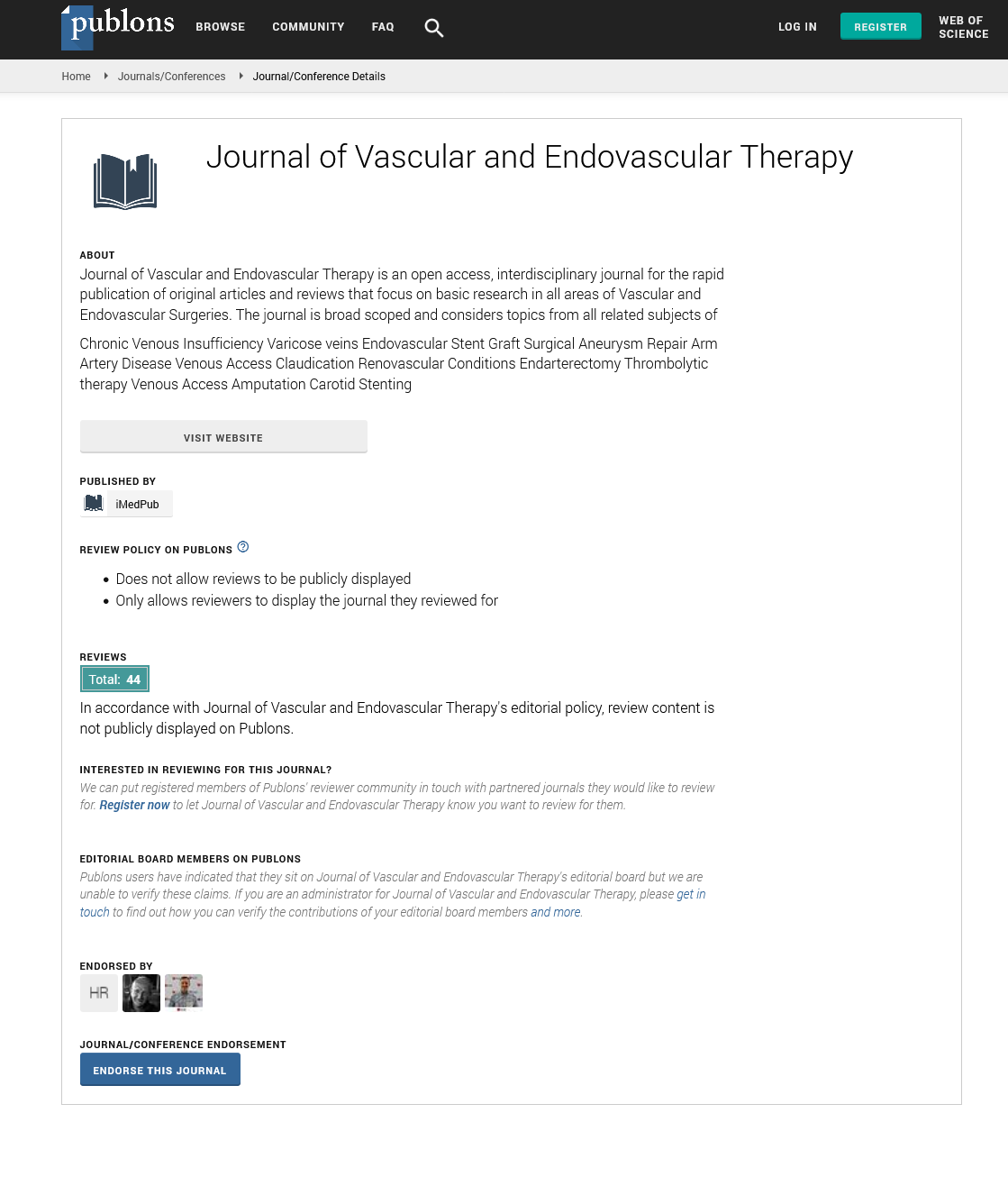ISSN : 2634-7156
Journal of Vascular and Endovascular Therapy
A novel view to varicose veins pathogenesis: Proteomic analysis
4th Edition of World Congress & Exhibition on Vascular Surgery
March 28-29, 2019 Rome, Italy
R Srinanthalogen, M Urbonavicius, A Hogh, G Urbonaviciene, J Cicenas, M Valius and S Urbonavicius
Hospitalsenhed Midt, Viborg, Denmark University of Copenhagen, Denmark Hospitalsenhed Midt, Silkeborg, Denmark Swiss Institute of Bioinformatics, University of Basel, Switzerland Vilnius University, Lithuania
Posters & Accepted Abstracts: J Vasc Endovasc Therapy
DOI: 10.21767/2573-4482-C1-006
Abstract
Introduction: The advent of proteomics techniques allows large-scale studies of gene expression at protein level. Although morphological and anatomical studies indicate that venous wall weakening and sub-endothelial fibrosis characterize varicose veins, the pathogenesis of varicose veins remains poorly understood. The aim this study is to obtain protein expression profiles in patients with varicose veins. Finally, the identification of possible biomarkers may open possibilities for pharmacological inhibition of disease progression.
Methods: Varicose saphenous veins removed during phlebectomy and normal saphenous veins obtained during vascular surgery were collected for proteomics analysis. The same layers of venous wall from varicose and non-varicose veins were incubated, and the proteins released were analyzed by ion mobility spectrometry (IMS-MS) with Synapt G2. All differentially expressed proteins and their pathways, coexpression and physical interactions were analyzed in GeneMANIA and AmiGO databases.
Results: Proteomic analysis of the human vein revealed totally 1389 proteins. 220 proteins demonstrated significant differences in their quantity (more than 1.5 fold) between the two types of venous tissue (p<0.05). Among the most differentially expressed proteins 10 were found significantly decreased in the varicose vein tissue, and only two-increased. CXXC-type zinc finger protein was more permanent (38-fold down regulated). This protein is known as receptor for vascular endothelial growth factor. Most prominent proteins were proved with Western Blotting analysis.
Conclusion: This study provides novel insights into the biochemical mechanisms of this disease and a basis for further studies. Our proteomics discovery approach suggests that altered connective tissue proteins and increased proteolytic enzyme activity appear to be central to the pathophysiology of varicose veins. Abnormalities in vein wall architecture probably precede the development of valvular incompetence and overt varicosities. Larger studies are required to confirm the potential and clinical role of the identified proteins.
Recent Publications
1. Oklu R, Habito R, Mayr M, Deipolyi A R, Albadawi H, Hesketh R, et al. (2012) Pathogenesis of varicose veins. J Vasc Interv Radiol. 23(1):33-9.
2. J Mazuchova M P, E Halasova, V Valentova, M Sarlinova, J Mazuch and S Zelnik (2016) News in pathogenesis of chronic venous insufficiency. Acta Medica Martiniana 5�12.
3. Demirkiran M A, Koksoy C, Heper A O and Bengisun U (2014) Does extracellular matrix of the varicose vein wall change according to clinical stage? Ulus Cerrahi Derg. 30(4):186�91.
4. Eberhardt R T and Raffetto J D (2014) Chronic venous insufficiency. Circulation 130(4):333�46.
5. Nordon I, Brar R, Hinchliffe R, Cockerill G, Loftus I and Thompson M (2009) The role of proteomic research in vascular disease. J Vasc Surg. 49(6):1602-12.
Biography
R Srinanthalogen is a Resident Doctor in Vascular Surgery at Regionshospitalet Viborg in Denmark and is also a part of the Cardiovascular Research Unit where she is involved in two research projects looking for disease biomarkers by using protein and peptide analyzing methods; A novel view to varicose veins pathogenesis: Proteomic analysis and Urine biomarkers for AAA rupture together with Dr. Sigitas Urbonavicius MD, PhD as her superviser. Her curiosity about and interest in understanding the mechanism of vascular diseases drives her towards improvement of different methods of diagnosis, prognosis, and treatment.
E-mail: reshe.logen@midt.rm.dk
Google Scholar citation report
Citations : 177
Journal of Vascular and Endovascular Therapy received 177 citations as per Google Scholar report
Journal of Vascular and Endovascular Therapy peer review process verified at publons
Abstracted/Indexed in
- Google Scholar
- Open J Gate
- Publons
- Geneva Foundation for Medical Education and Research
- Secret Search Engine Labs
Open Access Journals
- Aquaculture & Veterinary Science
- Chemistry & Chemical Sciences
- Clinical Sciences
- Engineering
- General Science
- Genetics & Molecular Biology
- Health Care & Nursing
- Immunology & Microbiology
- Materials Science
- Mathematics & Physics
- Medical Sciences
- Neurology & Psychiatry
- Oncology & Cancer Science
- Pharmaceutical Sciences
